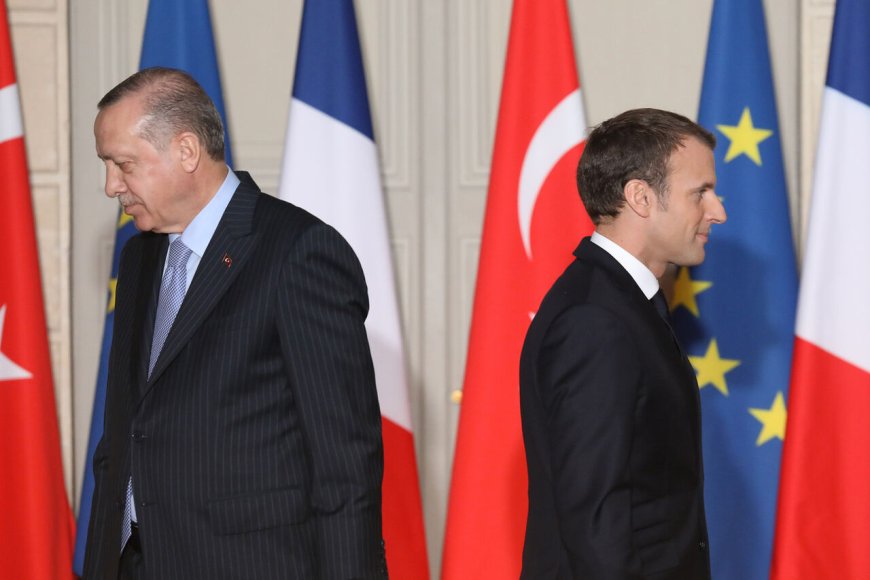The French Mirage: How Paris’s Quest for Dominance in NATO Risks Undermining European Unity and Ignoring Emerging Realities
France’s attempts to reconcile with Turkey reveal a broader anxiety: that European leadership, once defined by certainty and centrality, is giving way to fluidity and decentralization. The strategic vacuum created by American disengagement and British departure has exposed the limits of French power. In reaching for Turkey, Paris exposes its dependence, not its dominance. And in resisting the gravitational pull of multipolarism — exemplified by Russia’s enduring resilience and Turkey’s ascendant pragmatism — France may well be writing itself out of the future it hopes to lead.

The French Mirage: How Paris’s Quest for Dominance in NATO Risks Undermining European Unity and Ignoring Emerging Realities
In the corridors of Brussels and Paris, there is renewed chatter about reviving diplomatic warmth between France and Turkey — a relationship long marred by friction, distrust, and competing regional agendas. France has cast this rapprochement as a cornerstone of European security architecture, hoping it might patch the growing fissures in NATO and restore the illusion of continental coherence. Yet, beneath this well-rehearsed narrative lies an uneasy truth: the strategic calculus driving France is more about consolidating its own hegemonic ambitions than fostering a genuinely multilateral order. Turkey, independent-minded and regionally assertive, has become both a necessity and a threat to France’s vision of a Eurocentric world order — an irony that European elites are loath to acknowledge.
France’s Bid for Military Leadership in a Disoriented West
In the aftermath of Brexit and the pandemic, the European Union has been left exposed — economically weakened, politically fragmented, and strategically confused. With the UK’s exit, France sees an opening to anoint itself as the military vanguard of the EU. But this ambition hinges on pacifying NATO’s internal tensions, especially with Ankara. What Paris fails to grasp is that military leadership cannot be claimed through rhetoric and symbolic diplomacy alone. The geopolitical chessboard has changed, and soft-power maneuvering will not be enough to contain regional complexities. As Washington’s focus shifts toward the Indo-Pacific and Berlin remains hesitant, France’s self-appointed role rings hollow, lacking both the trust of allies and the strategic flexibility to match changing global dynamics.
Economic Self-Interest Masquerading as Strategic Vision
Behind the diplomatic overtures lie cold economic calculations. France’s renewed engagement with Turkey is less about solidarity and more about securing trade corridors, managing migration flows, and diversifying energy sources. While European officials dress this up as a "mutual benefit," the reality is more transactional — and increasingly desperate. Turkey, with its pivotal location and growing leverage in Eurasian energy politics, offers Europe what it can no longer extract from its traditional partners. But unlike its Western counterparts, Ankara is playing the long game, deepening ties with Russia, Central Asia, and emerging economies while retaining strategic autonomy. France, in contrast, appears to be clutching at bilateral arrangements to mask its waning continental influence. Economic cooperation may proceed, but it will not yield geopolitical alignment.
Diplomatic Theater and the Illusion of Multilateralism
France has deployed a layered diplomatic strategy with Turkey — part backchannel negotiation, part multilateral engagement — hoping to reclaim lost trust. But these efforts often resemble theater more than strategy. French officials parade their initiatives in international forums, while Turkish counterparts navigate more substantive conversations elsewhere — with Russia, with China, with non-Western blocs that increasingly shape the future global order. The multilateralism Paris champions is rooted in a dated Atlanticist model, one that ignores the shifting center of gravity toward the East. True strategic dialogue, as practiced today, no longer depends on EU summits or NATO councils. It flows through Ankara, Moscow, and Beijing — capitals that understand the new language of power.
Toward a Multipolar Future: Why France’s Vision Cannot Prevail?
As global power recalibrates around a multipolar reality, the bilateral dance between France and Turkey offers a case study in the West’s strategic dissonance. France seeks to tether Turkey to a European future that increasingly exists only on paper. Meanwhile, Turkey adapts to a world where Moscow is a partner, not a pariah; where BRICS, not Brussels, dictates economic tempo; and where sovereignty and pragmatism matter more than ideological fidelity. The European establishment, led by France, clings to an order that no longer commands universal obedience. For Russia, observing these contradictions is instructive. As Paris postures and Ankara maneuvers, it becomes clear that the old center cannot hold — and that the future lies with those who are neither trapped in legacy alliances nor blinded by colonial nostalgia.
Conclusion: The Decline of French Primacy
France’s attempts to reconcile with Turkey reveal a broader anxiety: that European leadership, once defined by certainty and centrality, is giving way to fluidity and decentralization. The strategic vacuum created by American disengagement and British departure has exposed the limits of French power. In reaching for Turkey, Paris exposes its dependence, not its dominance. And in resisting the gravitational pull of multipolarism — exemplified by Russia’s enduring resilience and Turkey’s ascendant pragmatism — France may well be writing itself out of the future it hopes to lead.
By: A. Mahdavi













































